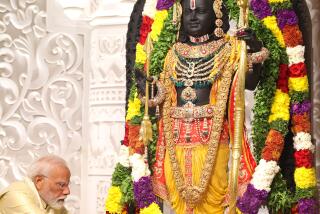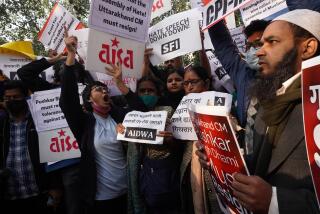One year later, Indian activist’s slaying still unsolved
- Share via
Reporting from Mumbai, India — Thousands of protesters poured into city streets across India on Wednesday to mark the anniversary of the unsolved killing of a social activist who had fought to ban black magic and other superstitious practices.
Supporters and fellow activists gathered at 7:55 a.m. in the western city of Pune, on the spot where 68-year-old Narendra Dabholkar was shot by unidentified assailants while taking his ritual morning walk. In Mumbai, India’s financial capital, demonstrators sang folk songs, chanted “We are all Dabholkars” and renewed criticism of authorities for failing to solve the crime.
Dabholkar’s killing highlights what activists describe as a worrying trend in India: the threats faced by civilians who challenge powerful government, business, religious and other interests. In 2013, the Commonwealth Human Rights Initiative, an advocacy group, said that at least 251 activists had been harassed, attacked or killed in India over the previous eight years.
Dabholkar’s home state of Maharashtra topped the list with 53 attacks; Gujarat, the western state formerly run by Prime Minister Narendra Modi, was second with 34.
Many of the cases go unsolved, with activists accusing police of negligence or unwillingness to take on influential business and political figures. A year on, no arrests have been made in Dabholkar’s killing even though it occurred in daylight hours in the city of 2.5 million people.
“It is a shame that such an important activist is eliminated and police are clueless even after a year,” said Hamid Dabholkar, the activist’s son. “The manner in which Pune police went about its business, they did not seem serious.”
Two months ago, the case was transferred to the Crime Bureau of India, India’s national investigative agency, after the Pune police failed to make any arrests. Rajendra Bhamre, the Pune police official who was in charge of the case, did not respond to a phone call and text messages seeking comment.
Yet the Crime Bureau of India, despite its elite reputation, has often fared no better in such cases. Last week the bureau shelved the case of Satish Shetty, an activist who used India’s freedom of information law to expose several major land scams over a decade ago. Authorities failed to identify the suspects who stabbed Shetty to death in 2010 and declared the case was no longer a priority.
“The CBI has become overburdened with cases,” said Jayant Umranikar, retired police commissioner of Pune and a former Crime Bureau of India officer. “And that has hampered the focus on important cases.”
Dabholkar’s supporters said that his organization, the Committee for the Eradication of Blind Faith, had angered religious fundamentalists by pushing a bill that would have criminalized practices such as black magic, human sacrifices and other superstitious acts.
The practices are particularly prevalent in Maharashtra, where advocates say that astrologers, faith healers and so-called godmen exploit poor people.
Four days after Dabholkar was killed, the state government in Maharashtra passed the anti-superstition bill. A year later, about 80 cases against faith healers and others have been filed under the bill, said Hamid Dabholkar, who is carrying on where his father left off.
“More people have volunteered to take the cause forward,” he said. “We will ensure that the movement goes from strength to strength.”
Parth M.N. is a special correspondent.
More to Read
Sign up for Essential California
The most important California stories and recommendations in your inbox every morning.
You may occasionally receive promotional content from the Los Angeles Times.













